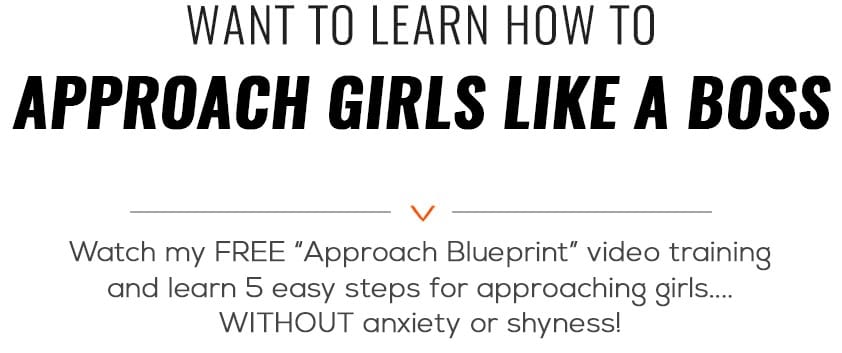Despite common logic and popular self-help advice, thinking “positive” is a poor life strategy.
Friends tell you to “hope for the best”. Self-improvement gurus preach “the law of attraction”. But it’s all BS. This type of thinking only leads to anxiety, depression, and disappointment.
(Why do you think the majority of the population has low self-esteem and poor productivity?)
Instead, you should find a life strategy that’s actually proven to work. For example, the ancient philosophy of Roman Stoicism…
In this article, you’ll learn 5 key Stoic principles to “upgrade” your way of thinking and quickly build confidence in yourself (and your ability to get shit done).
#1: Recognize the power of your thoughts
“You don’t have to turn this into something. It doesn’t have to upset you.”
– Marcus Aurelius
Your thoughts create your reality.
For proof of this, look no further than the existence of placebo effects.
Studies have shown that patients given simple sugar pills – but told they’re receiving actual medicine – have experienced very real changes in their body. In some cases, patients have experienced changes in heart rate and blood pressure. In other cases, patients have even experienced relief of symptoms related to Parkinson’s Disease.
Your thoughts can literally change how your body functions on a physiological level.
The ancient Roman Stoics recognized this amazing power. They recognized that we can decide how we respond to every situation in life.
If you get brutally rejected in front of a room full of people, you have a choice. You can get embarrassed and feel sorry for yourself. Or you can be proud of yourself for trying, and not give a fuck what these strangers think about you.
If your preferred presidential candidate doesn’t get elected, you have a choice. You can pick fights with people on the internet and try to prove them all wrong. Or you can accept reality and focus your energy on accomplishing your personal goals.
…The choice is always yours.
Action step: Think of a situation that’s currently stressing you out. How can you look at this situation differently? How can it help you grow stronger?
#2: Make a plan — then stop thinking
“First say to yourself what you would be, and then do what you have to do.”
– Epictetus
We live in the age of procrastination.
Every company I’ve worked for is more focused on having daily meetings than actually getting shit done. Everyone I meet is too caught up in “mental masturbation” to actually follow through on their intentions and accomplish their goals.
Sure, if you don’t have any goals to work towards, that’s the first step…
But once you decide on your goals, it’s time to stop thinking and start doing.
Thoughts and plans don’t mean shit. A genius idea isn’t worth shit, either. Not unless you put in the work and take the steps necessary to make it a reality.
Want to switch careers? Great. Decide something new to try, then go get qualified or certified, then start applying for jobs. Want to finally get in shape? Awesome. Lift weights 3 times per week and start eating the right amount of calories.
Stop “doing research”, stop “getting prepared”, and stop telling everyone about your sweet plan. Just get started. Today.
There’s a reason the ancient Stoics like the great Marcus Aurelius were so successful and accomplished. They took action. Over and over again.
Action step: Ask yourself, “What goals or plans have you been second guessing or procrastinating on?” Then ask, “What’s the next step I need to take?” Do it now.
#3: Embrace your failures and mistakes
“A gem cannot be polished without friction, nor a man perfected without trials.”
– Seneca
It doesn’t take a Stoic philosopher to tell you this one: failure is an inevitable part of life.
Just look at any successful person you know. Chances are they failed countless times on their path to success.
Most people are pussies. Most people get discouraged and quit after 1 or 2 mistakes.
If you think you’re going to start a successful business without losing money at some point, you’re being delusional. If you think you’re going to transform your social confidence and become a smooth casanova without facing rejection, you’re an idiot.
…And if you can’t stomach failure, that just means you need to face more of it.
You need to reframe failure as part of the learning process. Every time you make a mistake, realize that you just made progress. Failure shows you that you have more to learn. Failure shows you exactly where you need to improve and better yourself.
Action step: Think about a recent mistake you made. Ask yourself, “What lesson can I learn from this mistake?” Now be thankful for this lesson. You have grown stronger because of it.
#4: Consider how amazing your existence is
“When you arise in the morning, think of what a precious privilege it is to be alive.”
– Marcus Aurelius
The fact that you’re alive is a miracle.
The fact that there’s a universe at all is completely inexplicable by science.
The Roman Stoics recognized the power of this idea. They recognized that reminding yourself of the mystery of life is a powerful way to make you grateful for being alive.
Just think: what’s the point of taking everything so seriously? What’s the point in worrying about your receding hairline? What’s the point in stressing out about your job? What’s the point in being mad at your girlfriend?
You get to wake up and live life every day. And that’s fucking amazing.
I’m not trying to sound like some crazy preacher here. But it’s so true. And almost nobody takes the time to be grateful for the opportunity to be around for one more day.
Action step: Close your eyes. Place both hands over your heart. Think about how amazing it is that your heart is always beating. Be grateful for every minute you have left to live.
#5: Stop expecting — ground yourself in today
“Expecting is the greatest impediment to living. In anticipation of tomorrow, it loses today.”
– Seneca
Perhaps the greatest teaching of the Roman Stoics is the importance of being present and focusing on what’s in front of you right now.
Everybody worries about tomorrow. Everybody gets excited for upcoming holidays and vacations. Everybody forgets to enjoy what they’re actually doing.
You wake up and worry about getting to work on time. Then you sit at your desk and dream about what you’re going to eat for lunch. Then you eat lunch and feel miserable that you still have five more hours of work. Then you go back to your desk and dread going to the gym on the way home. Then you spend your whole workout anticipating eating dinner and watching the next episode of your favorite show on Netflix. And when you’re doing that? You just get depressed that you have to wake up early and go to work again.
If you spend every moment of the day thinking about what’s going to happen next, you prevent yourself from enjoy ANYTHING in life.
Instead, you must “catch yourself” daydreaming or worrying. And then you must re-focus on what you’re doing right now.
Realize that you’re dreading work tomorrow? Accept it, then get back to focusing on hanging out with your friend. Realize that you’re thinking about your date tonight? Accept it, then get back to working on your project.
This simple formula is the key to transforming your productivity and your self-confidence — when you’re focused, you naturally perform better.
Action step: The next time you feel stuck in your head, go for a walk. Focus on the sensations in the bottom of your feet. Whenever you catch yourself thinking, return focus to your feet.




Solid advice, thanks man
Thanks Caleb, glad you liked it
This is true, good advice. Although it seems strange to stop “positive thinking”, it does rest your mind. The principle from the book “the power of now” tells us how being in the present with no thinking is the way to live a good live similarly to Marcus Aurelius’s concept.
Thanks Vincent. I think the problem with “positive thinking” is that it’s vague advice that usually leads people to wishing things were different, overthinking, etc…
Great article. I like that the action steps because it tells you to do something not just read and forget it. Keep it up.
Thanks Kevin! Glad you found it useful my man.
Hello!
There are some really good points here, thanks for sharing! I like the way that in your articles, you address some very common challenges that most people have, and do it in a head on and clear manner.
I must say that using the word “pussy” in a context of referring to cowardice is sexist and insulting. It is well worth the small effort to communicate and accentuate your message without utilising misogynous language for edgyness.
Integral part of becoming strong is valueing honesty and fair play, and integral part of becoming a strong man and a good ally is to appropriately engage sexist and other oppressive behaviour, both inside and outside of yourself.
We all have growing edges and femmephobia is ingrained in our western culture, so it is a challenge to grow past it. I hope my words were inspiring and useful for you.
Keep up the otherwise great content and I’m looking forward for more inclusive rhetoric,
Soni
Great advice. But #1 is a proponent of positive thinking, #4 is a way of doing that. At least as far as I know it. I agree that thinking positive will not magically give you anything, but positive thinking, because of the power of your mind, can give you a more constructive outlook.
It reminds me of the pretty Stoic advice of James Stockdale: “This is a very important lesson. You must never confuse faith that you will prevail in the end—which you can never afford to lose—with the discipline to confront the most brutal facts of your current reality, whatever they might be.” https://en.wikipedia.org/wiki/James_Stockdale
Which goes hand in hand with the embracement of failure and making a plan. Hahaha, what I wanted to say, I agree with what you say,.. but there other nuanced ways to look at it.
Cheers
Hey Timon, good points man. I agree, but I don’t like the vague “keep your head up” or “just think positive” quotes that get thrown around a lot.
We need specific thought strategies to get there.
Hi! Your article focuses on more universal part of Stoicism. But I think that with common sense you can have similar conclusions, without getting into stoicism. Don’t get me wrong, article is cool and a lot of people don’t want to dig into philosophy, so this’ is enough, but I’m curious: do you practise stoicism or just take some their advices into your life? If you practise, what do you think about their not-so-obvious advices, like negative visualisation?
And last thing: english isn’t my main language, so I hope this comment isn’t full of mistakes, so you can read this without bleeding from your eyes.
I don’t “practice” stoicism. I only borrow the mindsets that I find useful. In combination with mindfulness meditation, these things help me deal with the daily anxieties of living life.
I thought so. I have just read book about stoicism (philosophy always seems interesting for me, so I decided to do something with it) and suddenly I become more sensitive on every sign of it. I think about borrowing some their advices to create in me less demanding attitude and I’m glad to find out, that someone do something similar with good output.
So many people waste their time visualizing but not taking action.
Yet another excellent article. Very good distillation of the most vital stuff. Thanks.
Man,
I can’t begin to tell you how many people I have talked to that say they want it, when in fact, they are downright lying to themselves and me. As you said, wanting it and doing it are two different things. If you want something, go out and prove it.
Ever notice how many people in our day and age are plastering motivational quotes all over their social media as if to say, “Hey, look at me. I am taking action over here.” When they don’t realize is if you merely put up a quote and not do anything about it, you are no different than the guy sitting at home in his recliner, channel surfing his way to a miserable existence.
Action is the key to life. If you don’t plan on taking any, don’t waste everyone else’s time.
I’ve been told that “being positive” shouldn’t be all “smiley”, and that at the end of the day the key to being positive is just to not care. I guess people have different interpretations of positive.
I can only add a little advice. Be maximally mundane and do not dream about everything at once.
Have only one real goal and cut off all the bullshit.
Agreed. Focus is key.
I realize this site is primarily directed toward men, but I really appreciate the Real Talk. I love the Stoic philosophy but I’ve been stuck in one of those “planning everything” modes and not living the things I’m learning. About to take those action steps and get started on actually LIVING my life instead of planning it. Thanks a bunch! 🙂
Glad you liked it!
Absolutely brilliant article. I read this every time I start to feel like I’m getting pissed off with life, it instantly grounds me.
Thank you David 🙂
Glad it helps, thanks Hollie!
I have always been a positive thinker, full of expectations that led to some happiness but mostly disappointment. Since I have started studying stoicism I feel so much happier. I still struggle with old tendencies but I recover quickly once I apply stoic principles. Excellent article!! Very helpful to me!!
Thank you! Glad it helped!
Thanks brother! I have been making lists and not checking boxes for months. Today is fucking tomorrow!I am a teacher and will pass the word on in better language.
this works like MAGIC! thanks man.
Ah I accidentally put this down as reply for another comment, though it was intended here on it’s own. No intention to fill the comment section, only to put my comment in it’s right place here:
Hello!
There are some really good points here, thanks for sharing! I like the way that in your articles, you address some very common challenges that most people have, and do it in a head on and clear manner.
I must say that using the word “pussy” in a context of referring to cowardice is sexist and insulting. It is well worth the small effort to communicate and accentuate your message without utilising misogynous language for edgyness.
Integral part of becoming strong is valueing honesty and fair play, and integral part of becoming a strong man and a good ally is to appropriately engage sexist and other oppressive behaviour, both inside and outside of yourself.
We all have growing edges and femmephobia is ingrained in our western culture, so it is a challenge to grow past it. I hope my words were inspiring and useful for you.
Keep up the otherwise great content and I’m looking forward for more inclusive rhetoric,
Soni
Ah I accidentally put this down as reply for another comment, though it was intended here on it’s own. doodle jump